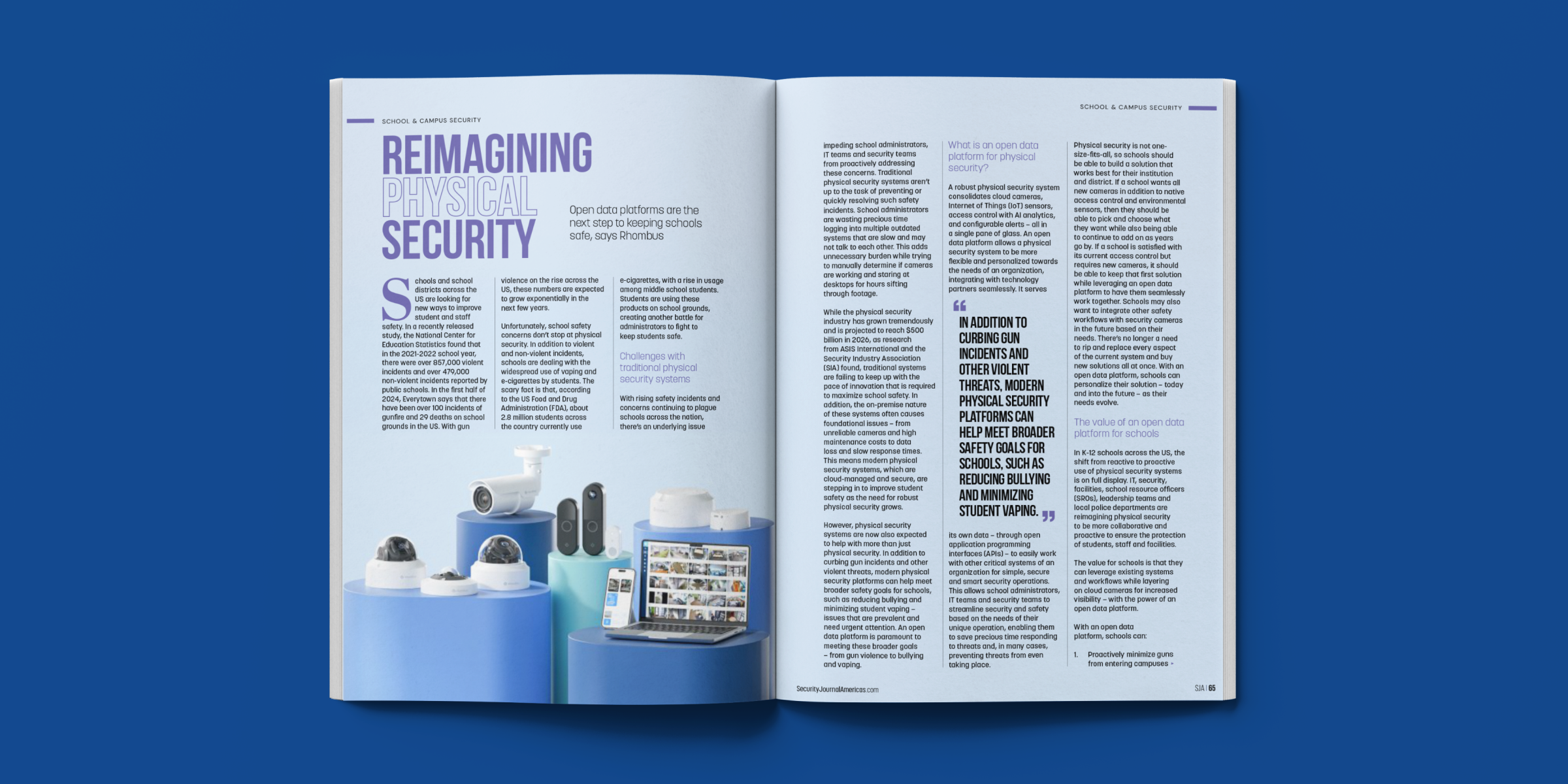Is It Legal to Have Security Cameras in the Workplace? Learn About Laws Related to Video Surveillance System

As technology advances, video security is becoming more prevalent in the modern workplace. Business owners and organizations worldwide increasingly utilize video surveillance to help protect their assets and employees. An increasing trend is installing security cameras, which enhances safety and protects both assets and employees by deterring crime, reducing internal theft, and potentially lowering insurance premiums.
For an organization looking to implement video security, or currently using security cameras, understanding the basic surveillance laws is critical to help protect you and your employees.
In this article, we’ll discuss the following key points:
- Office & workplace surveillance laws in the U.S.
- Legal and common use cases for video surveillance
- Laws on workplace privacy under the presence of surveillance cameras
- Illegal use cases for video surveillance
Office & workplace surveillance laws in the U.S.
Are security cameras legal in offices?
Yes, security cameras and video surveillance in the workplace are legal according to U.S. Law.
However, this comes with a caveat: an organization must have legitimate business reasons for installing security surveillance cameras in the workplace. The following section will go over common use cases in more detail.
Notifying employees of video surveillance
In almost all cases, employers must disclose the presence of security cameras to their employees. It’s highly recommended to notify employees of the workplace surveillance policy, including camera locations, and obtain written confirmation of their understanding and consent to be recorded.
When employers monitor employees, it is crucial to inform them about the monitoring practices and obtain their consent to address potential privacy concerns. Most employers disclose this information in an employee handbook.
Exact regulations vary on a state-by-state basis. Some states outlaw hidden cameras outright—Connecticut, for example, legally requires employers to notify employees of video surveillance. Meanwhile, some courts in other states have protected the use of hidden cameras in the workplace in highly specific circumstances.
For more information, see the article Are You Required to Notify Employees or Customers That You Have Security Cameras?
Legal and common use cases for workplace surveillance
A legitimate business purpose must justify the use of security surveillance cameras at work. Nearly all organizations have a genuine need to enforce security, investigate illegal or improper conduct, and oversee onsite operations and productivity.
These all qualify as legitimate business needs that rely on video surveillance to be most effective.
In practice, this means that employers can legally monitor a wide scope of activities at work. Video surveillance supports many use cases, and these are some of the most common:
Physical Safety and Employee Wellbeing
Safety is a key reason that organizations use video surveillance. If an organization has been broken into or has had problems with disruptive or unwanted people entering their space, video surveillance is legal in most states to ensure better physical security.
Video surveillance cameras play a crucial role in enhancing safety and compliance by monitoring activities and ensuring adherence to policies.
This is especially common in workplaces that serve the public or have large numbers of clients on site:
- In the non-profit space, UACDC receives over 80,000 visitors per year and uses security cameras to quickly respond to potential emergencies and guard against trespassers and unauthorized individuals.
- In the student housing industry, CA Ventures use video surveillance in conjunction with onsite security guards to increase resident safety via centralized monitoring.
- In the healthcare industry, Praesum Healthcare uses security cameras to enhance patient and provider safety and ensure patients receive the proper level of care.
Employee Accountability
Security cameras are permitted in most states if an organization believes its employees are engaging in unlawful behavior (drinking, illicit drugs, engaging in dangerous or reckless behavior) while on the clock.
Workplace video surveillance, however, brings up significant legal and ethical implications, including the rules governing the use and disclosure of surveillance records. Employers must balance employee privacy rights with the necessity for safety and compliance in various business environments, highlighting the challenges they face when implementing such systems.
For example, chain restaurant Blake’s Lotaburger caught two employees committing credit card fraud. Their security cameras allowed their security team to discover the crime and provide law enforcement with the necessary evidence to hold the perpetrators responsible.
External Theft
If an organization has had issues with customers stealing in the past, then the use of video security is legal. Using video security can help prevent external theft from reoccurring.
Video surveillance systems are essential in enhancing security and protecting assets across various industries. For example, Colony Hardware upgraded its video surveillance system in order to deal with theft. One of their locations was robbed by thieves who disabled their old NVR-style surveillance system and stole a massive amount of merchandise. This prompted Colony to switch to a modern cloud-based video surveillance system with cameras that cannot be compromised as a group.
Internal Theft
Theft prevention is not limited to external causes. Video surveillance can be a powerful tool to reduce shrinkage and internal theft. If an organization has an issue with company theft or employees are engaging in dishonest behavior, then the use of security cameras is lawful so long as your state deems it legal to do so.
Laws on workplace privacy
Where is video surveillance illegal?
In general, video surveillance is not permitted in areas where people have a “reasonable expectation of privacy.” As a rule of thumb, this includes areas such as:
- Restrooms: Using security cameras in restrooms is prohibited as it infringes on employee privacy rights.
- Locker Rooms: Using security cameras in locker rooms falls under the same reasoning as restrooms. Cameras cannot be used to record people changing clothes.
- Employee Lounges: Employee lounges or break rooms cannot be recorded in some states since employees go to these places to find rest, comfort, and privacy.
If you still want to ensure safety and security in spaces where surveillance cameras are not permitted you can use solutions such as sensors that go beyond workplace video surveillance.
When is video surveillance illegal?
At a federal level in the U.S., no explicit laws prohibit employers from monitoring workers with video surveillance. In general, determining what level of monitoring vs. privacy is acceptable is left to the states.
Certain exceptions exist—for example, the federal government prohibits video surveillance in these circumstances:
- Union activities: Employers are not permitted to use video surveillance to cover union activities. Monitoring union activities in this way violates Section 7 of the National Labor Relations Act.
- Classified & protected activities: There are case-by-case situations in which workers engaged in certain classified, or otherwise protected activities may be prohibited from surveillance.
Video surveillance vs. audio surveillance
Audio surveillance is much more restricted than video surveillance. Many laws exist at the federal and state level that prohibit the recording of audio.
If you intend to use audio surveillance alongside video surveillance, it’s critical to consult your local laws to ensure you comply.
Takeaways
Using security cameras in your office is entirely legal as long as you have a valid reason and it does not violate your state’s employee privacy laws. If you are unsure about the legality of your use case, it’s best to consult a legal representative or reach out to your State Labor Agency.
If you have any questions about using video surveillance in a safe and legal manner or would like to install or upgrade your video surveillance system, please reach out to the Rhombus team at sales@rhombus.com.
Rohan Hemrajani serves as Director of Product & Content Marketing at Rhombus. He has over 10 years of marketing experience, ranging from multinational to startup brands, with the majority in the IoT industry. Rohan has launched several new products and programs designed to deliver safety and efficiency across diverse industries.



